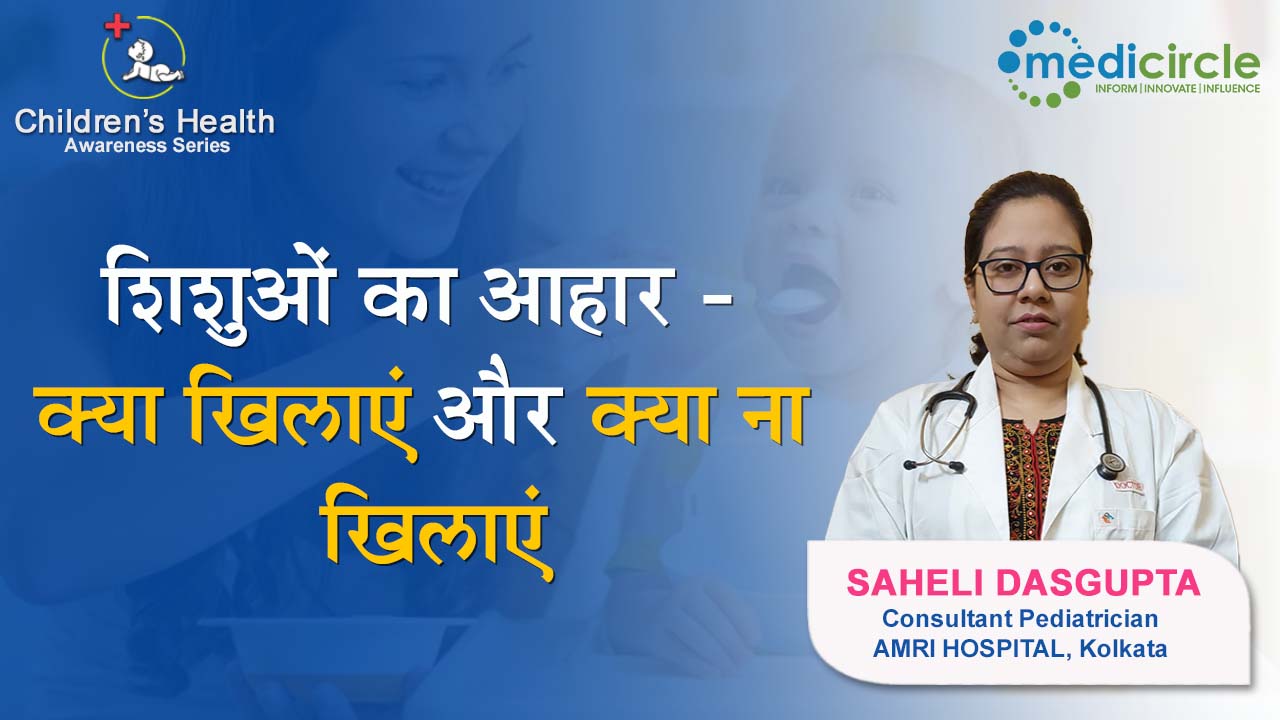Dr. Saheli Dasgupta is a Consultant Pediatrician at Amri Hospital, Mukundapur, Kolkata. For the past 12 years, she has been working in this field.
An adequate well-balanced diet is crucial for child survival, health, growth, and development. Healthy eating in childhood means they will have less chance of developing chronic diseases like heart disease, type 2 diabetes, obesity, and some cancers. Well-nourished children are more likely to be healthy, productive, and ready to learn. It also means they feel better and enjoy life more.
Breastfeeding babies
Doctors and experts generally advised babies should be given exclusively breastfeeding till six months of age. But we should always keep in our mind that from six months onwards breastfeeding will not produce enough nutrition and immunity for the baby. For that, there is a need to start some complementary food. One can start with rice, pulses, and grains as complementary food. Along with this, the mother should continue breastfeeding the baby.
Solid foods for a 6-month-old baby
“Along with the mother’s milk, you can start with single cereals. Initially, you can start with rice, mashed potato, some pulses, and in fruits Chiku, mashed banana, and boiled apples. You should take care of one thing whenever you start any solid food, start one by one, and don’t give everything together. This is in case the baby is having an allergy to any food; it can be sorted out. So, start with these foods and gradually increase them,” adds Dr. Saheli.
Homemade food for baby
Dr. Saheli emphasizes, “Homemade food has all the essential nutrients, carbohydrates, fats, vitamins, and minerals. Homemade food is good for the baby. Outside food may contain some sort of preservatives, or an excess amount of sugar, which is not good for the baby. Doctors recommend homemade food for babies.”
Constipation in babies
Dr. Saheli explains, “Whenever we start solid food for the baby, they have the tendency to get constipated or bloated. But that is very normal. The family shouldn’t stop giving solid food and rather should consult a Pediatrician. Talking about vomiting, a baby might vomit 1-2 times, it is normal. But if the baby is vomiting 4-5 times or after every feed, then you should always consult the Child Specialists.”
Foods to be avoided to 6-month-old babies
-
Salt – Salt is not needed up to 1 year of age, it adds loads to the kidneys.
-
Sugar – Not needed up to 12 months of age
-
Raw eggs or improperly boiled eggs (saturated fat)
-
Cheese
-
Honey
- Any food containing preservatives
How to know if the baby got full?
Initially, the baby doesn’t take much, 1-2 spoons is enough. Then gradually increase the portion. But if the baby refuses, starts crying, or moves away from the food, it means the baby is not liking the food or does not want to have the food. One more thing should be taken care of, don’t give any milk or water 2 hours before offering food.
FAQs
1. Does a baby cry mean they are hungry?
Not at all, there may be other reasons why babies cry. Any kind of body pain or discomfort may also make them cry.
2. Solid food and fever
No, during fever babies generally do not like to eat solid food. They like more liquid foods. You can give them soup, and coconut water but don’t force your baby to eat.
3. Non-veg food for babies
Nonveg foods are recommended after 1 year of age because they may contain some protein that one might be allergic to the baby.
(Edited by Renu Gupta)

 An adequate well-balanced diet is crucial for child survival, health, growth, and development. Healthy eating in childhood means they will have less chance of developing chronic diseases like heart disease, type 2 diabetes, obesity, and some cancers. Here is the detailed information on the baby’s food chart directly from the experts.
An adequate well-balanced diet is crucial for child survival, health, growth, and development. Healthy eating in childhood means they will have less chance of developing chronic diseases like heart disease, type 2 diabetes, obesity, and some cancers. Here is the detailed information on the baby’s food chart directly from the experts.









.jpeg)






.jpeg)

.jpg)





.png)




